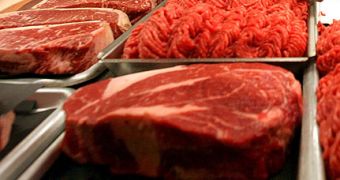A team of researchers working with the University of Cambridge recently decided to investigate what would happen environmentally-wise should UK's population suddenly decide to cut down on its current red and processed meat intake.
Health benefits aside, the scientists discovered that the country's ecological footprint would also be considerably diminished.
As explained by Dr. Louise Aston, “We [the team of researchers] estimated what would happen if the whole population adopted the diet of the fifth with the lowest red and processed meat consumption, which is an obtainable goal since a large proportion of the population are already eating these lower amounts.”
Apparently, having the entire nation change its dietary habits in such a way is bound to translate into a reduction of greenhouse gas emissions which would be the equivalent of 28 million tonnes of CO2 no longer being released into the atmosphere on a yearly basis.
This is because, whereas the males/females in the top fifth consume about 137 g / 88 g (4.83 ounces / 3.10 ounces) on a daily basis, those in the lowest fifth only eat 56 g / 34 g (1.98 ounces / 1.20 ounces).
““Reducing red and processed meat consumption will bring health benefits to individuals who make the changes, in addition to bringing long-term benefits to the health of the global population through climate change mitigation,” Dr. Louise Aston goes on to explain.
As we previously reported, our planet's global food industry is presently overstraining the resources human society has at its disposal, primarily because the business of raising cattle for use in the kitchen requires that major efforts are made to grow sufficient such animals so as to support nations whose main nutrient source is represented by meat.
Therefore, no harm can come out of keeping a close eye both on our health, and on the environment, simply by opting for more environmentally friendly food alternatives instead.

 14 DAY TRIAL //
14 DAY TRIAL //